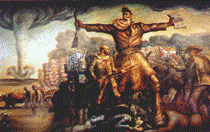History, Department of

James A. Rawley Graduate Conference in the Humanities
Date of this Version
April 2007
Document Type
Article
Abstract
Though an oft-parodied stereotype today, the treasured expectations of manliness were intractable and concrete in the South and impacted every stratum of society. Fully developed before the advent of the Civil War, these masculine ideals did not disappear with the Confederate States of America— they lingered and even grew in tenacity, shaping nearly every facet of southern life. Given its deep entrenchment in southern thought and life, the complexity of what Richard Yarborough calls the “mythology of masculinity” occupies much modern southern historical research. Relying heavily on both personal and public documents, southern historians provide a valuable framework for understanding the mindset of southern men and those who occupied their world. However, nonhistorians have also sought to consider possible answers to questions about ideal manhood through fictional exploration. From its Old South roots through the fallout caused by the loss of the Civil War, three novels by Octavia Butler, Margaret Mitchell, and Charles W. Chesnutt each use literary license to more fully explore the real-world implications of the southern system of masculinity and the complications contained therein.


Comments
Paper delivered at the 2nd Annual James A. Rawley Graduate Conference in the Humanities, Lincoln, NE. April 7, 2007. Copyright © 2007 Catherine Biba.